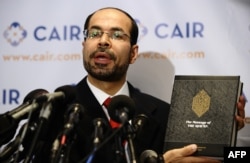As Muslim participants arrived in Philadelphia for the 2016 Democratic National Convention, they gathered on the sidelines along with Philadelphia’s Muslim American Host Committee and community leaders to discuss American Muslims’ participation in the election and political process.
The delegates and community leaders strongly urged their fellow Muslims to actively participate in the country’s political life.
Muslims in America make up only 1 percent of the national vote, but community leaders believe that the Muslim vote is crucial in many communities where the Muslim population is higher than 1 percent, such as Michigan, Virginia, Minnesota and California.
“There are a lot of places in this country where the Muslim vote is crucial,” Representative Keith Ellison, America’s first Muslim member of Congress, told VOA.
'Be a blessing'
“Engage, get involved, be a blessing to the community you live in, take responsibility for a stronger, better community,” the Minnesota Democrat added.
Ellison and Muslim community leaders believe that Muslims should be involved not only in the economic sector but also in the political process in the country, including the upcoming election.
“If we want to be heard ... or even feel the need to better our lives in the U.S., then our only option is to be involved in politics,” Virginia artist Omar Ahmadzai told VOA.
“By being politically involved, we decrease chances of our community being neglected or any policies that might be detrimental to us," Ahmadzai said. “If we do not involve ourselves in politics, we are doing a great disservice to our community.”
Some participants at the Democratic Party’s convention in Philadelphia say Muslim youths should particularly get involved in social and political affairs.
“We [young people] are the future, so we have to be at the table and be a part of this political process and be a part of the decision-making process,” political activist Saleema Sazwal told VOA.
Some Muslims claim that participation in U.S. politics is un-Islamic because, according to them, some of the laws in the country contradict Islamic teachings. But the Muslim participants in Philadelphia rejected those claims.
Heed the history
“They should really read the history of Islam. They should reread the Quran and the traditions of Prophet Muhammad,” Nihad Awad, executive director of the U.S.-based Council on American-Islamic Relations, told VOA.
“I strongly believe that if you are a good Muslim, you should be a good American. So it is that part of my faith that has given me this incentive to be a good American and to be involved,” Awad added.
According to Tahera Shirzay, who has been an election officer in Virginia for the past few years, some naturalized groups have rarely participated in the political process.
“They miss a crucial chance in the decision-making of their lives,” Shirzay told VOA. “Especially Muslims, who have been blamed for many unfortunate incidents, should, more than ever, get active and educate themselves on how to vote for their own good and their children's future.”
A Pew Research Center survey estimated that there were about 3.3 million Muslims of all ages living in the United States in 2015, and according to a 2009 poll by Gallup, U.S. Muslims had the second-highest level of education among major religious groups in the country.





